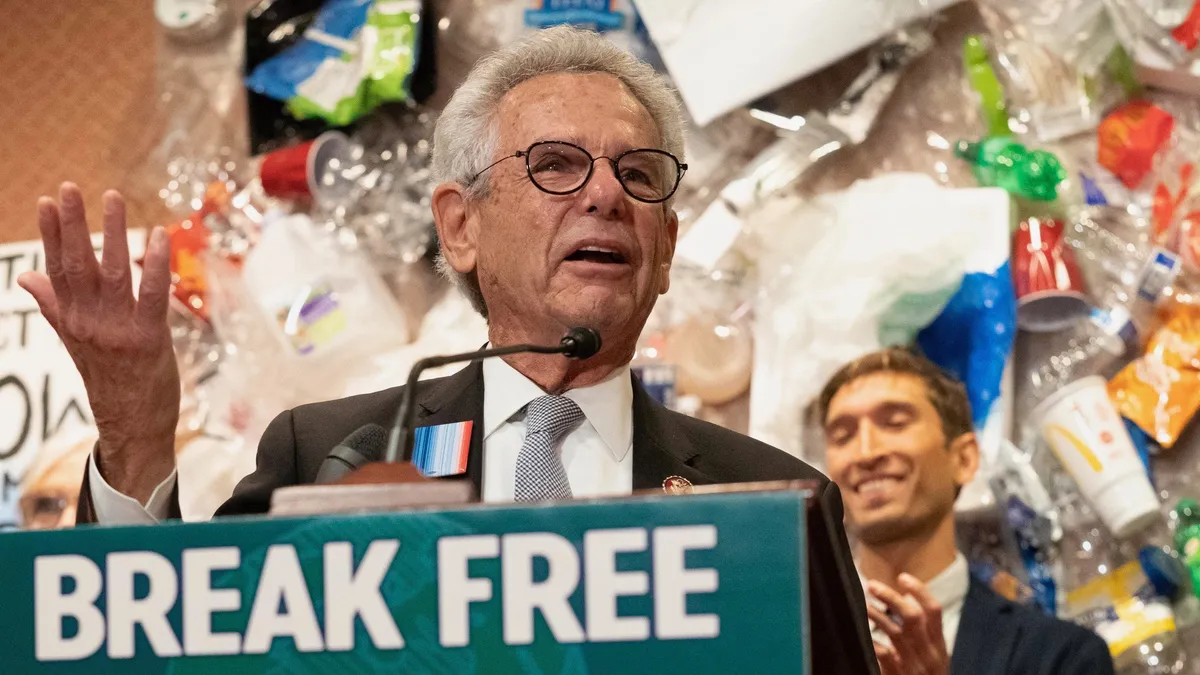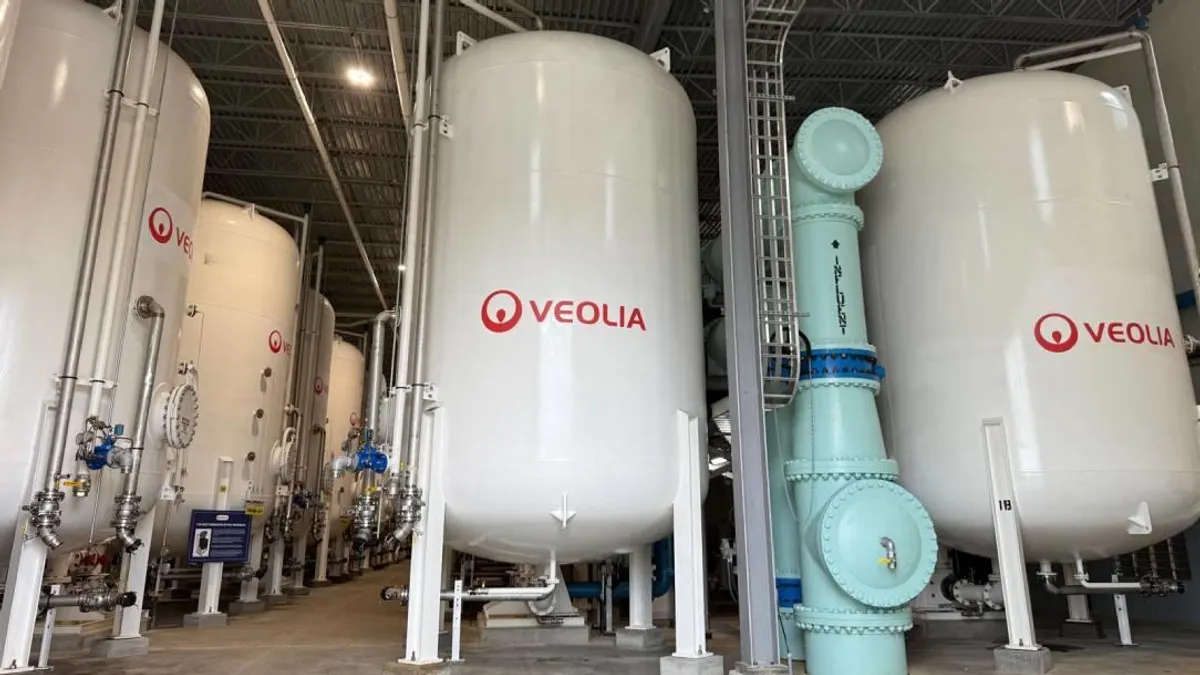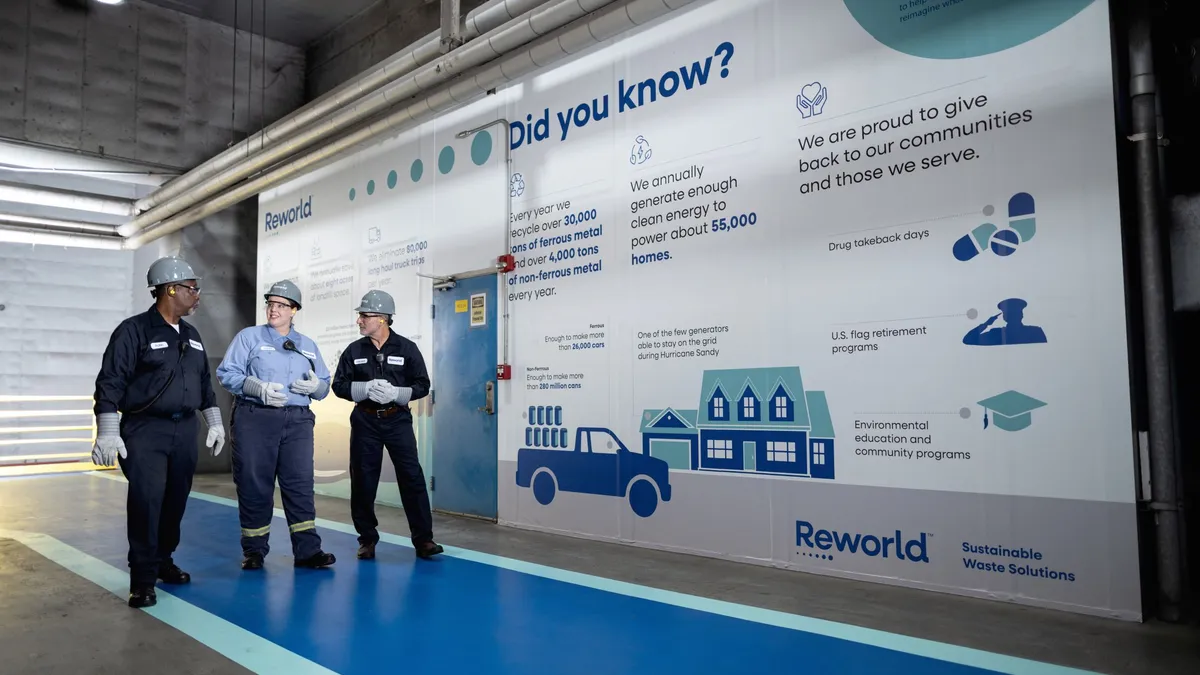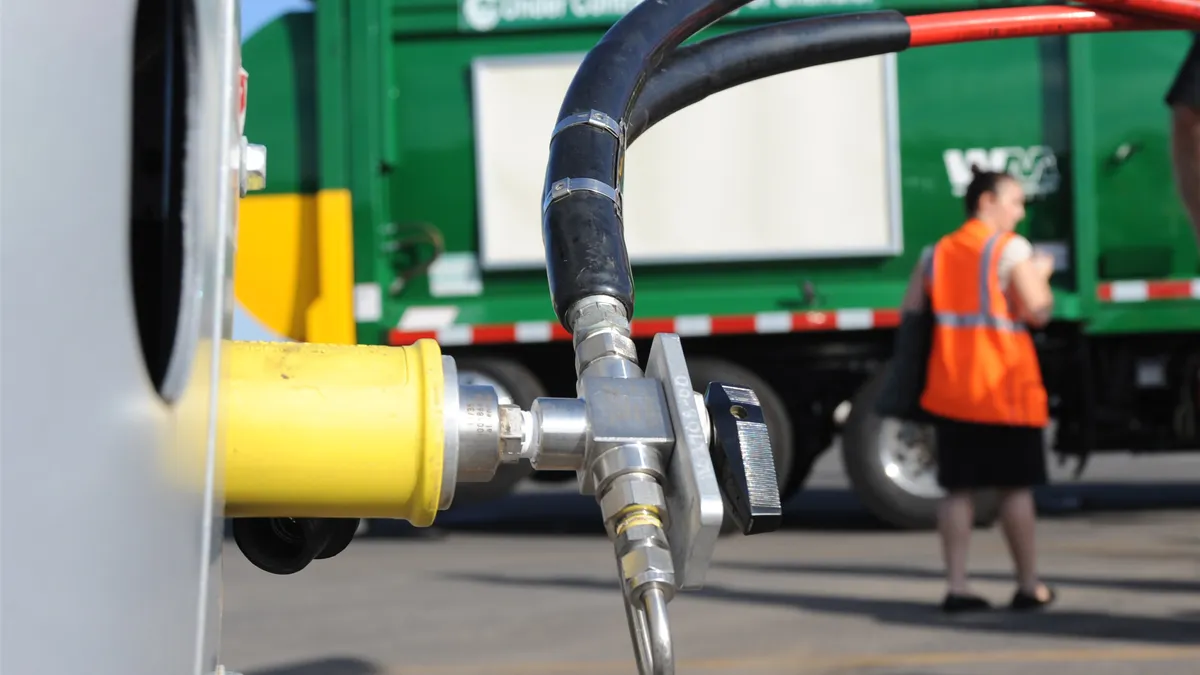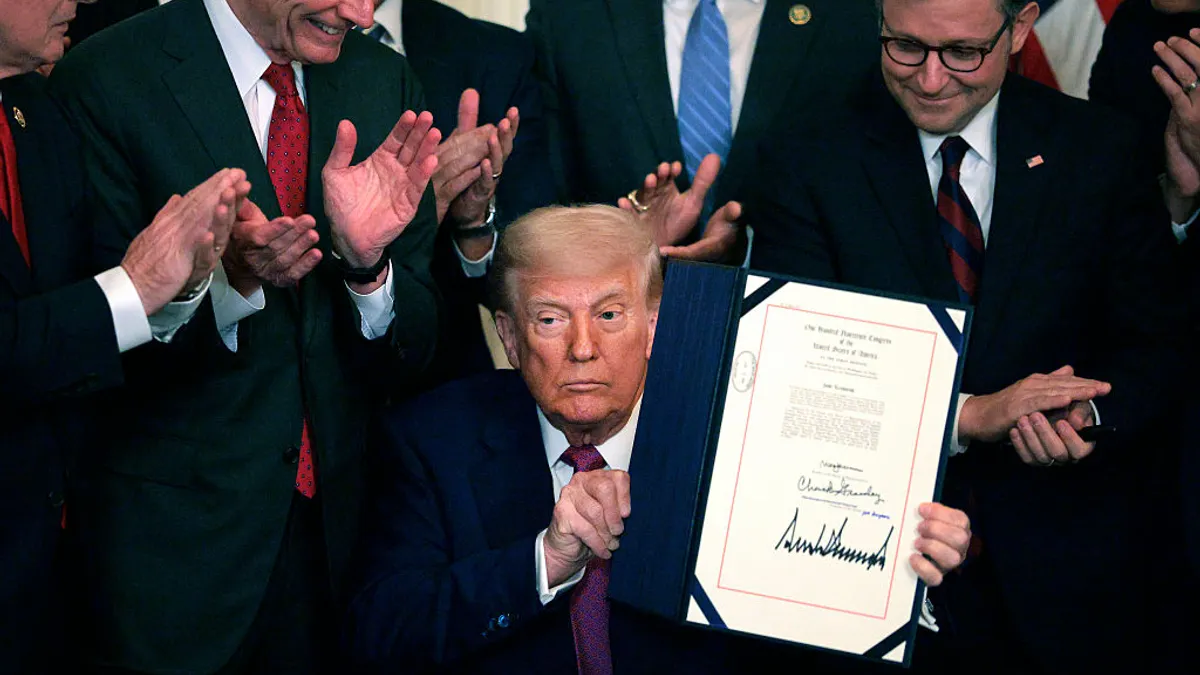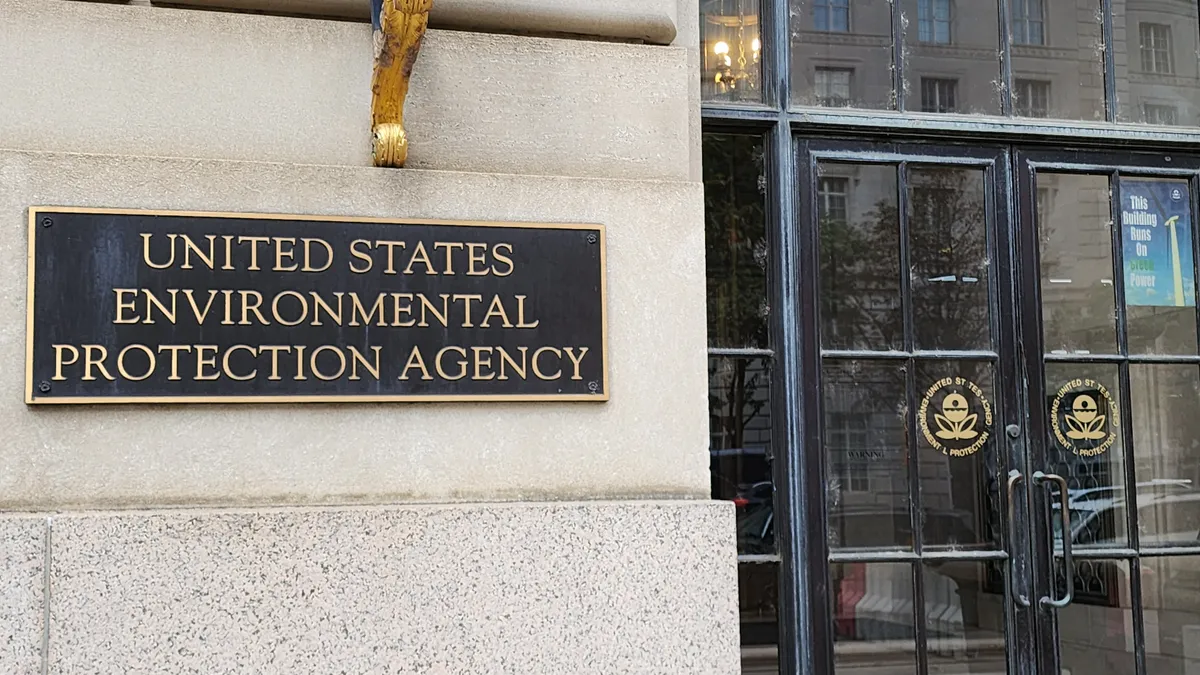Federal lawmakers debuted the Break Free From Plastic Pollution Act on Tuesday, after months of build-up kicking off what is likely to be a heated fight over the legislation. The bill would enshrine extended producer responsibility (EPR) for plastic bottles, packaging and assorted items, along with creating a national container deposit system.
Rep. Alan Lowenthal (D-Calif.) and Sen. Tom Udall (D-NM), who have been working on the legislation since last summer, joined with Sen. Jeff Merkley (D-Ore.) and Rep. Katherine Clark (D-Mass.) to sponsor the legislation. The bill is co-sponsored by more than two dozen other House members, as well as five additional senators. So far, no Republicans have signed on.
Udall cited growing public concern over marine debris and plastic pollution as a motivating factor, in addition to heightened scrutiny over unstable scrap commodity markets, on a Monday call with reporters.
"Our plastic pollution process has reached a tipping point and the American people are fed up," said Udall, who also cited climate change as another incentive, given that plastics largely come from oil refineries. One 2019 report from the Center for International and Environmental Law found the plastics industry is on track to produce as many emissions as more than 600 coal-fired power plants by mid-century.
The act comes in the midst of a significant uptick in federal legislation focused on waste and recycling. Several of the bills currently in play are popular with industry, thanks to their focus on issues such as infrastructure and education. But the Break Free From Plastic Pollution Act homes in on supply chain issues more directly, a contrast the lawmakers emphasized.
"Ours is the only bill in Congress that deals with the source of the problem," Udall asserted.
Along with Lowenthal, Udall argued the other bills have largely been supplied by industry, including the "Save Our Seas 2.0" Act, which focuses on plastics at the end of their lifecycle. That bill recently passed the Senate unanimously after ultimately winning support from Udall.
By contrast, the Break Free From Plastic Pollution Act offers what some in the waste and recycling industry have panned as a "kitchen sink" approach. Supporters say the sweeping nature is necessary to enact meaningful change.
Targeting plastics on every level
Under the bill, producers would have to take responsibility for collecting and recycling materials, and would be encouraged to join with makers of similar products through Producer Responsibility Organizations (PROs).
Those organizations are "a common component in all EPR programs," according to Kristin Aldred Cheek, director of policy and programs for the supportive Product Stewardship Institute (PSI). PROs allow for streamlining and help producers come together to work with existing infrastructure, Cheek told Waste Dive.
Other components of the bill include a 10-cent refund for all beverage containers, regardless of material, with unclaimed refunds going to beverage producers. States that currently have similar systems would be encouraged to maintain them if they meet federal standards. The bill's sponsors said local and state governments would be free to exceed federal thresholds as well.
Certain types of plastics increasingly under fire due to their low recyclability rates and potential for pollution would also be banned beginning January 2022. This would include plastic carryout bags; expanded polystyrene "food service products" and shipping materials; plastic stirrers and utensils; single-use bottles for shampoo and other hotel toiletries; and "non-compostable" produce stickers. Plastic straws would also be limited, but still available upon request. Relevant federal agencies would moreover be tasked with proposing measures to reduce the environmental impacts of plastic tobacco filters, electronic cigarette parts and derelict fishing gear.
The legislation also includes a fee for "non-plastic carryout bags," along with a minimum post-consumer recycled (PCR) content threshold for plastic beverage containers that would steadily increase over time. Levels would begin at 25% PCR in 2025 and culminate in 80% by 2040.
PROs would be required to develop their own product stewardship plans to be approved by the U.S. EPA every five years. Those plans would detail how to meet required performance targets, including 65% reused or recycled minimums for all covered products apart from paper by 2028, and 75% recycling for beverage containers and paper by that same date.
The EPA would also be prompted to develop standardized recycling and composting labels, addressing ongoing education and awareness issues. And in a likely controversial move, the act would put a temporary freeze on new plastics production facilities while the government investigates their health and environmental impacts. Lawmakers said that would include any involved in "transforming natural gas to plastic." Exporting plastics to developing countries without the capability to manage them would also be banned, in a nod to concerns about marine debris in Southeast Asian countries.
Mixed reactions likely
Plastics groups such as the American Chemistry Council have responded critically and the National Waste and Recycling Association (NWRA) came out against a draft version last fall. Similar reactions are likely from other players in the space given the bill's focus on shifting responsibility onto producers and away from local governments.
David Biderman, executive director and CEO for the Solid Waste Association of North America, told Waste Dive his organization has not taken a position on the legislation but sees its odds as unlikely in Congress, given factors including "competing pro-recycling bills, several of which have bipartisan support."
Circular economy proponents and other recycling groups are expected to offer varying reactions. While some prefer voluntary goals and commitments outside of regulations, others see legislation as one of the only viable paths forward.
Susan Collins, executive director for the Container Recycling Institute, praised the bill's container deposit system and called it a "powerful incentive" for industry. Yvette Arellano, a policy researcher with the Texas Environmental Justice Advocacy Series, emphasized the legislation's focus on environmental justice and communities impacted by proximity to petrochemical plants.
But for some waste and recycling industry players, one major distinction could spell the difference between support and opposition.
Two archetypal EPR models currently exist in Canada, associated with two different provinces, Québec and British Columbia. The Québec model relies more on pre-existing systems and infrastructure, with producers reimbursing local municipalities for costs incurred. The British Columbia model implements a system where producers are largely in charge of the full process, from production to recycling.
The waste and recycling industry has largely resisted any system that could undermine current contracts and agreements with municipalities, as they believe the second model does. That model has generated pushback from nonprofits concerned about corporate control, such as the Institute for Local Self-Reliance.
The Break Free From Plastic Pollution Act favors the British Columbia approach, Scott Cassel, PSI's CEO and founder, told Waste Dive. He argued that system will shift the burden away from taxpayers and said municipalities would still have options under the legislation, especially given how many pre-existing systems they currently have.
"This acknowledges that there can be some transitions that can take place over time," he said.
Proponents of the producer-driven approach also maintain such a system creates a more level playing field. At present, they say, some companies commit to stricter standards on a voluntary basis, which can put them at a disadvantage — something the Udall-Lowenthal legislation seeks to rectify. Cassel also said the bill has led to some positive industry dialogue already, including significant time working out details with the Flexible Packaging Association.
Recycling industry veterans have expressed mixed predictions for the new bill's odds in Congress, given anticipated opposition from industry players and the existence of many other legislative priorities in an already busy election year. But Udall said he expects to see state and local governments "start replicating" the bill, allowing it to build momentum with or without passage at the federal level. He even signaled support for those efforts could be bipartisan.
"The way we look at it is, the federal legislation is the mirror and consistent with what's going on in the states," said Cassel. "We see them as complementary."
This national discussion could factor into similar EPR proposals already advancing at the state level, including an upcoming bill in Maine that favors a Québec approach and has some potential buy-in from the waste industry. Vermont, California, Massachusetts, Oregon, Washington, Indiana, New York and Connecticut are also considering – or are set to consider – their own EPR policies in the near future.


